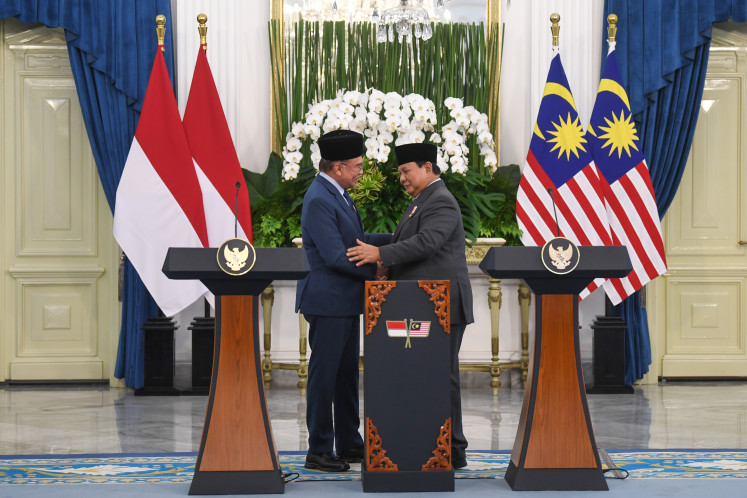Popular Reads
Top Results
Can't find what you're looking for?
View all search resultsPopular Reads
Top Results
Can't find what you're looking for?
View all search resultsElection organizers optimistic despite doubts of analysts
Both the Home Ministry, which is responsible for the organization of the upcoming simultaneous regional elections on Dec
Change text size
Gift Premium Articles
to Anyone

Both the Home Ministry, which is responsible for the organization of the upcoming simultaneous regional elections on Dec. 9, and the National Police, who are responsible for the security arrangements for the elections, have expressed their readiness to organize and make the elections a success.
'In general, the General Elections Commission [KPU] as the organizer of the simultaneous regional elections, the Elections Supervisory Agency [Bawaslu] and other organizing elements down to election committees at the polling stations are ready to organize the elections. All administrative problems, including problematic candidates and the distribution of ballot papers, have also been settled,' Home Minister, Tjahjo Kumolo, said in a recent interview.
'We ['¦] arranged a coordinating meeting involving all relevant parties, including election organizers, regional governments, contesting candidates, the police, the Indonesian Military [TNI], the Attorney General's Office [AGO], the National Intelligence Agency [BIN] and the media, during which I told the audience that the fate of the upcoming elections relied on all of us.
'['¦] We have everything well prepared although we need to improve coordination among parties in the field,' National Police chief, Gen. Badrodin Haiti, said in a separate interview recently.
While individual elections for regional heads across the country have been organized since 2005, the simultaneous organization of so many elections across the country, which will involve 269 regencies and mayoralties, is being staged for the first time in Indonesia ' and most likely in the world. Although this will be only the first phase of a scheduled three phases of regional elections that will be held until 2018, organizing such a massive 'political fiesta' is indeed a giant project that needs thorough and careful preparation as well as comprehensive supervision and dispute-settlement mechanisms.
The 10th report of the Habibie Center, which was published in November, warns of potential problems and challenges including violence during the organization of the regional elections. The report, a joint project of the center, the office of the Coordinating Human Development and Culture Minister and the World Bank, recorded that between 2005 and 2014, there were 1,027 regional elections held at provincial, regency and mayoralty levels in Indonesia.
'A monitoring survey by the center held in 16 provinces in the 2005-2014 period found 1,323 cases of violence during the organization of 565 regional elections. Those incidents caused 53 people fatalities, 1,172 others were injured and 829 buildings were destroyed,' the report said.
'Of all the regions surveyed, Aceh, South Sulawesi and North Maluku were the provinces with the highest incidence of violence,' it revealed.
Bawono Kumoro, a political researcher with the Habibie Center, cited a number of potential triggers of conflicts in the elections. One of the serious potential triggers is the diversity of the Indonesian people.
'Unlike a national-level election such as the presidential election, regional elections are prone to conflicts as issues of ethnicity, race and religion have repeatedly been the trigger for conflicts. Worse is the fact that these will be simultaneous elections and an accumulation of conflicts in many regions will create a very serious security problem in the country,' he said.
Another potential trigger is doubt about the neutrality of the elections organizer, in this case the KPU. Bawono said that he once met a regional KPU official who expressed his uneasiness when an incumbent, who ran for re-election, eventually won the election.
'Even when we honestly and professionally performed our duties as an election organizer, people tended to be suspicious that we had had a hand in the incumbent's victory,' Bawono said, quoting the official.

Particular associations with an incumbent who is seeking re-election raise questions, and doubts on the neutrality of local bureaucrats ' the secretary of a regency or a mayoralty, sub-district heads and village heads ' continue to be a serious potential trigger of violence.
'It is a fact that an incumbent has structural influence on his or her subordinates,' Bawono said.
'The fact that an incumbent must quit his post prior to running for re-election does not limit the possibility of such power abuse,' he added.
Titi Anggraini, executive director of the Association for Elections and Democracy (Perludem), shared Bawono's opinion on the potential triggers of violence in regional elections.
On top of questions about the organizer's and local bureaucrats' neutrality, Titi added the 'unpreparedness mentality', especially for losers in the elections, as another significant trigger for violence in elections.
'It is true that a loser's unpreparedness mentality is more due to provocation by provocateurs. But, the challenge has become greater as these will be simultaneous elections this time,' she said.
Titi specifically highlighted the benefits that incumbents seeking re-election will continue to enjoy in the upcoming elections.
'Despite the introduction of a series of new election rules that are meant to provide equal opportunity for those contesting the regional elections, incumbents will still be favored,' she said.
'And the new election rules that regulate strict campaign schedules and limited distribution of posters, banners and other campaign materials will even benefit the incumbents as they are already popular among the local population after serving for five years in office compared with those running for the first time,' Titi added.
The government is obviously aware of these problems and is committed to continuously making improvements until the organization of the third phase of the simultaneous regional elections in 2018.
'We [the government] have attempted to minimize, if not eliminate, all potential sources of irregularities and manipulations in the upcoming simultaneous regional elections,' Tjahjo said.
'We are aware of the existing loopholes in both the regulations and the organization of the elections this time. But, we'll try to improve them in the next elections,' the minister added.
Badrodin said the police and other related security agencies had carefully and thoroughly made security arrangements and preparations.
'We have designed security measures ahead of the elections, including a contingency plan in the case of emergency. Police officers that will be on duty during the elections have also been given special training regarding security precautions and preparations for the elections,' the police chief said.
'A back-up security plan is also prepared and so is the equipment,' he added.
Both the minister and the police chief expressed their optimism that the elections would be successful.
'This is the first experience of organizing such simultaneous regional elections. A successful election this time will create a positive environment for democratization in the country, including for the next simultaneous regional elections and for relations between the central government and the regional administrations,' Tjahjo said.
'It will be described as a success if the simultaneous regional elections are held in the absence of social conflict. Arguments are tolerable as long as they don't lead to physical violence ['¦] Hopefully, there will be no violence, or eruption of social conflict,' Badrodin said.
' Ika Krismantari contributed to this reporting









